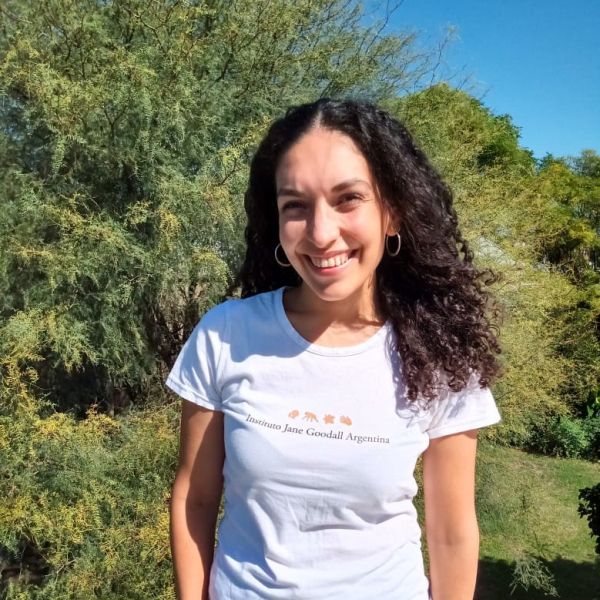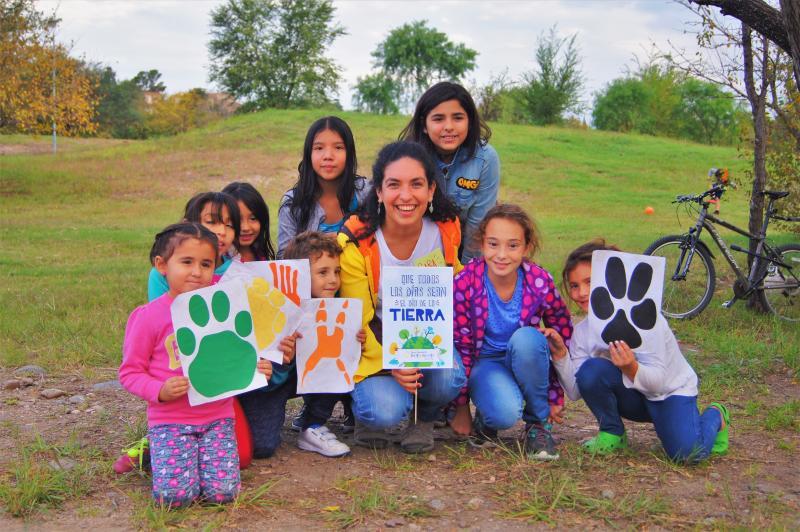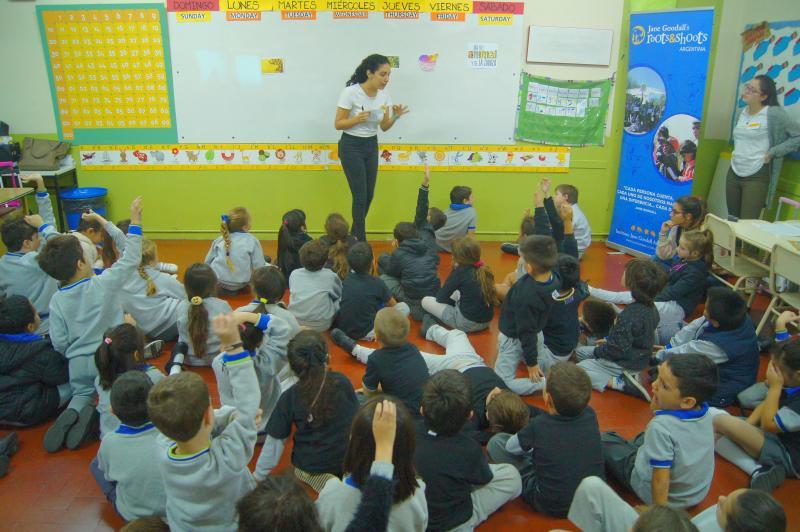Image

-
Sara Alamo
Regional Coordinator, Roots & Shoots, Jane Goodall Institute
- 30 Under 30
- 2019
- Changemaker Grantee
2021 EE 30 Under 30 Changemaker Grant Project
Weaving a net to restore the Sierras de Cordoba Native Forest
Our goal for this project is to raise awareness about the importance of conservation and restoration for the maintenance of ecological services provided by our native forest, conducting workshops in different localities of the region that are in recovery from fires or deforested areas, involving the entire community in restoration processes to generate changemakers across generations. We are an interdisciplinary group of professionals and students volunteering with the Jane Goodall Institute Argentina, and we strongly believe in the transformative potential of environmental education to empower children, youth, and communities.
**********
EE 30 Under 30 Biography
Córdoba, Argentina
Age: 28
Sara is the regional coordinator of Roots & Shoots, educating children, youth, and teachers in Cordoba, Argentina.
Tell us about yourself!
Since 2010, I have been a volunteer for Roots & Shoots (R&S), the global educational and humanitarian program of the Jane Goodall Institute, in Córdoba, Argentina. I currently coordinate the team of volunteers in my region, listening to them and providing them with tools and inspiration. I have managed to develop R&S socio-environmental priorities, so that our actions reach a large number of children, youth, and teachers. I have created and sustained initiatives, groups, and campaigns, taking them globally. Among my tasks is to design training for teachers, where I teach them how to design and develop environmental projects in which they analyze environmental issues and solutions. I also develop workshops for schools on topics related to native forests, illegal species trafficking, and more.
In 2018, I participated in a meeting of R&S representatives from around the world, where we discussed various topics and joint solutions to similar problems. One case was the expansion of the “Peace Without Borders” campaign, which launched in four Latin American countries, and since last year, thanks to my participation, was expanded to countries in South America, Africa and Asia. The project is connecting children from different countries to tell about their challenges, all motivated to make a better and fairer place.
That same year, I participated in COY14 (Youth Conference), an event organized by YOUNGO which is part of the United Nations Framework Convention on Climate Change (UNFCCC). By attending this event, I was able to acquire tools and information about global and local climate change, and then share them with my R&S team.

What inspired you to become a champion for environmental education?
From a very young age, nature has fascinated me. This is, why when I finished school, I decided to study biology and better understand nature. But studying and researching was not enough – I needed to share all this knowledge with the community and help out as much as possible.
So, my vocation as an environmental educator begins with enjoying every activity, talk, workshop, and game performed. Teamwork with R&S volunteers is very enriching, and we are in constant communication, achieving a sincere, talented, capable, and strong human group to face new challenges together. I couldn't do it alone, and it's in a group like this where I feel happier, inspiring me day by day to be a better educator and a better person.
I feel that there are no barriers working in environmental education – there is nothing that we cannot work on creatively and collectively, and there is no problem that we cannot address.
What advice would you give to the next generation of leaders that are looking to bring about positive change in their communities through EE?
Think locally, not globally. It is common to be discouraged when you analyze a global environmental problem. It seems impossible. But there is a reality – you are part of a community that knows you, respects you, and contains you. You know your region, you love it, and you know it is important in your life. Therefore, start by thinking about small actions in your region, in your neighborhood, or in your school.
Little actions do matter. Everything we do, day by day, matters. The valuable thing is to add positive actions and be constant in our actions and infect your family and friends with new positive habits.
Seek allies. Facing change alone is difficult, so I recommend looking for allies to accompany and exchange experiences with you.
Read and analyze critically. Check your information with a critical eye, and do not necessarily stick with what the newspapers say. Search, learn, think, and comment. If you want to educate others, it is important to have a deep understanding of the issue!
Plan and distribute tasks. Having a team has been essential for my work. With a team, it can be easier to develop and plan activities over time, and set concrete and measurable goals. Do not overwork yourself!
And finally, look for creative ways to educate!

What keeps you motivated, inspired, or hopeful for the future?
I've only had positive experiences working in environmental education. Sometimes they have been complex, but that doesn't mean they haven't been good! It is not an easy job, but I have always found hope in children, in teachers who fight for education that is connected to nature, and in the beautiful team I work with. Every time I give a workshop I learn something new.
Children have been a great source of inspiration for me to continue on this path. I hope to help them get to know the beautiful animals of my country, and enjoy our landscapes and native forests. My goal is for them to understand why our native forest is so important, why our ocean is so beautiful and vital, and why we shouldn’t have wild animals as pets – giving them the courage to just us by taking action and being part of the change!
Who do you look up to as inspiration for your work?
Jane Goodall. She has been my hero since childhood, watching her interact with chimpanzees and living in the jungle. She was also the first female researcher I met in my life, and I then got to know the rest of her humanitarian and environmental work within the global R&S program. How could I not admire her? She is an inexhaustible source of hope, and she captivates everyone who listens to her, regardless of age, nationality, or religion.
She is an inspiration and role model for women activists, educators, and researchers, and she always says that children motivate her to continue working. I feel the same! With her work, activism, and message of peace, it is she who inspires me and fills me with hope and light.